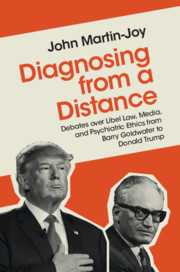 Diagnosing from a Distance
Diagnosing from a Distance Book contents
- Diagnosing from a Distance
- Diagnosing from a Distance
- Copyright page
- Dedication
- Contents
- About the Author
- Acknowledgments
- Abbreviations
- Introduction An Ethical Dilemma
- Chapter 1 Psychoanalysis, Media, and Politics from the Rise of Hitler to the 1950s
- Part I Diagnosis from a Distance and Libel Law in the 1960s: Goldwater v. Ginzburg
- Chapter 2 Ralph Ginzburg
- Chapter 3 “To Remove This Precedent”
- Chapter 4 Ginzburg, Goldwater, and the Supreme Court
- Part II Professionalization and the Rise of the Goldwater Rule
- Appendix The Goldwater Rule in 1973 and Today
- Photographs of Key People and Events
- Notes
- Works Cited
- Index
Chapter 2 - Ralph Ginzburg
Provocateur
from Part I - Diagnosis from a Distance and Libel Law in the 1960s: Goldwater v. Ginzburg
Published online by Cambridge University Press: 29 February 2020
- Diagnosing from a Distance
- Diagnosing from a Distance
- Copyright page
- Dedication
- Contents
- About the Author
- Acknowledgments
- Abbreviations
- Introduction An Ethical Dilemma
- Chapter 1 Psychoanalysis, Media, and Politics from the Rise of Hitler to the 1950s
- Part I Diagnosis from a Distance and Libel Law in the 1960s: Goldwater v. Ginzburg
- Chapter 2 Ralph Ginzburg
- Chapter 3 “To Remove This Precedent”
- Chapter 4 Ginzburg, Goldwater, and the Supreme Court
- Part II Professionalization and the Rise of the Goldwater Rule
- Appendix The Goldwater Rule in 1973 and Today
- Photographs of Key People and Events
- Notes
- Works Cited
- Index
Summary
In this chapter, I show how the infamous Fact magazine episode of 1964 began. What motivated Ralph Ginzburg to publish his “survey” of psychiatrists and to create a psychological profile of Barry Goldwater? I reassess Ginzburg’s controversial but now almost forgotten career as a provocateur and alleged pornographer (a charge that conservative politicians made loosely, based on his conviction for distributing the highbrow Eros magazine). Ginzburg remained committed to free speech and journalistic freedom in an era when television, newspapers, and direct mail advertising were flourishing. But was the survey ethical? Was Goldwater mentally ill and a danger to the country, as Ginzburg and many psychiatrists claimed? I make use of rarely explored sources, including the transcript of the Goldwater v. Ginzburg libel case, Ralph Ginzburg’s papers, and an original interview with Fact managing editor Warren Boroson. In an era when the Supreme Court decision in New York Times v. Sullivan had dramatically loosened libel law and established a new standard for libel called “actual malice,” Ginzburg had every reason to believe he might prevail in the courts, and in the court of public opinion.
Keywords
- Type
- Chapter
- Information
- Diagnosing from a DistanceDebates over Libel Law, Media, and Psychiatric Ethics from Barry Goldwater to Donald Trump, pp. 47 - 85Publisher: Cambridge University PressPrint publication year: 2020


